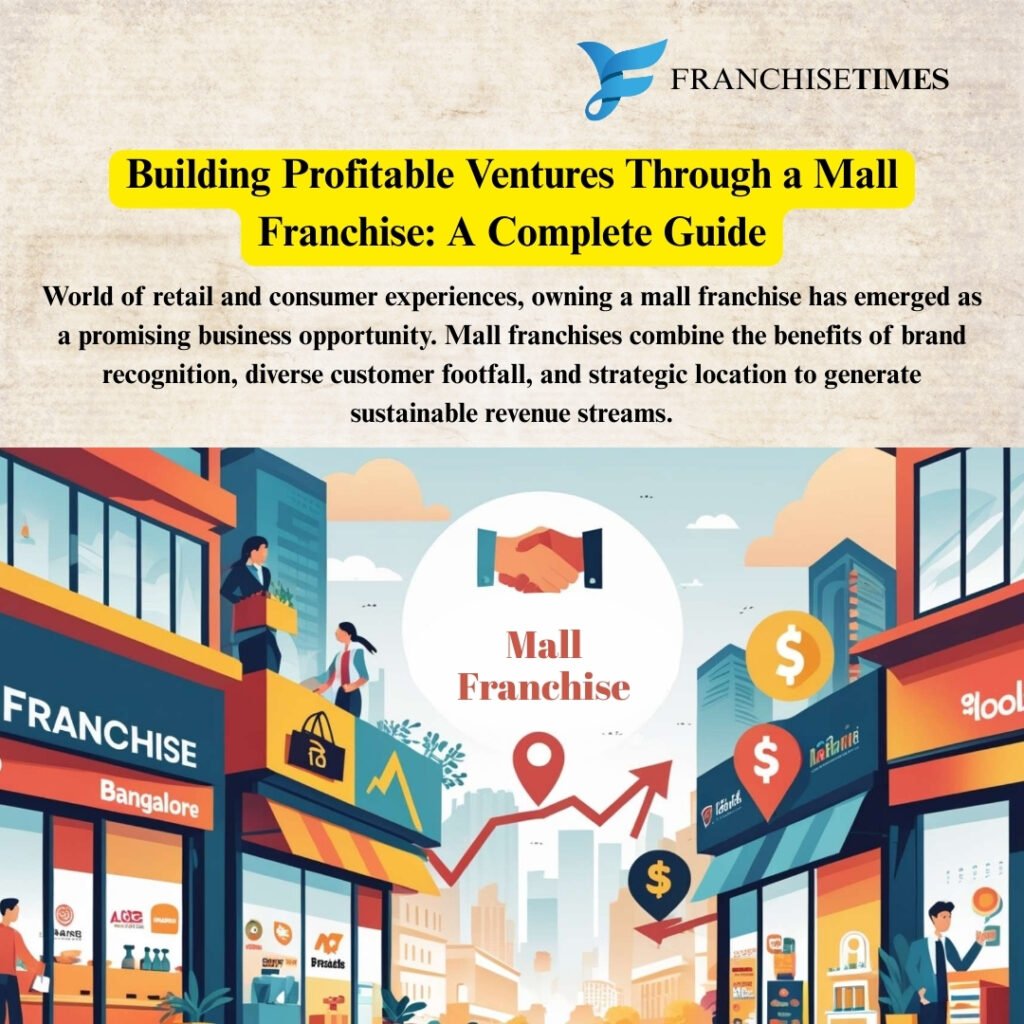Building Profitable Ventures Through a Mall Franchise: A Complete Guide
In the dynamic world of retail and consumer experiences, owning a emerging Mall Franchise Business Opportunities. Mall franchises combine the benefits of brand recognition, diverse customer footfall, and strategic location to generate sustainable revenue streams. From budding entrepreneurs to established business owners, a mall franchise offers an ecosystem where commerce and creativity meet.

The concept revolves around operating or managing a retail hub that hosts multiple brands under one roof. Unlike standalone stores, mall franchises provide a variety of services, entertainment options, and shopping experiences. This blend of convenience and variety attracts a larger audience, increasing the chances of consistent sales and long-term growth. In this guide, we will explore the essentials of starting a mall franchise, the benefits, the challenges, and the strategies to maximize profitability.
Understanding the Concept of a Mall Franchise
A mall franchise is more than just a shopping center. It represents a collaborative business model where multiple brands and service providers coexist within a single premises. Franchise owners either invest in a pre-established mall brand or obtain the rights to operate a branch under a recognized retail network.
The model provides a dual advantage. Firstly, it leverages the parent brand’s credibility, reducing the marketing burden. Secondly, it benefits from high customer traffic, as malls attract people not only for shopping but also for entertainment and dining experiences.
Moreover, mall franchises can vary in size and scale. They may range from small retail complexes focusing on niche markets to large, multi-level shopping centers housing international brands. The choice of franchise depends on the investor’s budget, target audience, and strategic vision.
By integrating modern retail technologies, like digital payment systems, interactive directories, and loyalty programs, mall franchises enhance the shopping experience, attracting repeat visitors. This creates a win-win scenario for both franchise owners and the brands operating within the mall.
Key Advantages of Owning a Mall Franchise
Investing in a mall franchise comes with several distinct advantages:
- Brand Recognition: Partnering with a reputable mall franchise ensures instant brand credibility. Consumers often prefer familiar names, which reduces the initial hurdle of attracting footfall.
- Diverse Revenue Streams: Beyond retail rentals, mall owners can earn through advertising spaces, event hosting, parking fees, and food courts. This diversification strengthens financial stability.
- Higher Customer Footfall: Malls are designed to attract a large audience. Strategic marketing, festive promotions, and loyalty programs further enhance traffic, leading to higher sales.
- Support and Training: Franchise agreements often include comprehensive support, from operational management to staff training, marketing strategies, and store layout optimization.
- Economies of Scale: Bulk purchasing, centralized advertising, and shared operational costs reduce overheads and improve profit margins.
These advantages make mall franchises attractive not only for retail investors but also for those exploring long-term business ventures with minimized risk.
Steps to Start a Mall Franchise
Launching a mall franchise requires careful planning and strategic execution. Here’s a step-by-step approach:
- Market Research: Begin by studying the local market trends, consumer behavior, and competitor presence. Identify gaps and opportunities to position your mall effectively.
- Franchise Selection: Choose a mall franchise that aligns with your budget, target audience, and long-term goals. Evaluate the brand’s reputation, operational support, and growth trajectory.
- Financial Planning: Prepare a detailed financial model, including initial investment, operational costs, expected revenue, and contingency funds. Ensure adequate capital is allocated for marketing and infrastructure.
- Legal Formalities: Complete the franchise agreement, acquire licenses, and comply with local zoning and safety regulations. This ensures smooth operational legality.
- Operational Setup: Design the mall layout, negotiate with potential tenants, and install modern amenities. Efficient space utilization enhances customer experience and boosts tenant satisfaction.
- Marketing Strategy: Promote the mall through digital campaigns, local media, community events, and social media engagement. A well-planned launch attracts initial visitors and establishes brand presence.
- Performance Monitoring: Track footfall, sales, and customer feedback regularly. Use analytics to optimize operations, introduce new services, and improve overall profitability.
Following these steps increases the likelihood of establishing a successful mall franchise that thrives in competitive markets.
Challenges in Managing a Mall Franchise
While Mall Franchise Business Opportunities offer significant advantages, there are challenges that investors must anticipate:
- High Initial Investment: Setting up a mall franchise requires substantial capital for infrastructure, marketing, and staffing. Investors must plan finances carefully to avoid cash flow issues.
- Operational Complexity: Managing multiple tenants, coordinating events, and maintaining facilities require strong managerial skills. Inefficient operations can impact customer satisfaction.
- Market Competition: Competing with existing malls and online shopping platforms necessitates innovative strategies and differentiated services.
- Tenant Dependence: Revenue from rentals depends on tenant performance. High vacancy rates or poorly performing tenants can affect profitability.
- Changing Consumer Behavior: Consumer preferences evolve rapidly. Franchise owners must adapt to trends like experiential retail, online integration, and personalized services.
Overcoming these challenges requires proactive management, continuous market research, and investment in technology and customer engagement strategies.
Strategies to Maximize Profits from a Mall Franchise
To ensure long-term success, consider these strategies:
- Tenant Mix Optimization: Curate a diverse mix of tenants, balancing anchor stores, niche outlets, dining options, and entertainment facilities. This attracts varied customer segments.
- Enhanced Customer Experience: Invest in cleanliness, parking facilities, security, digital directories, and interactive zones. Positive experiences encourage repeat visits.
- Seasonal Promotions: Run festive events, discount campaigns, and community activities to boost footfall during peak seasons.
- Digital Marketing: Utilize social media, email campaigns, and mobile apps to engage customers, inform them about events, and promote loyalty programs.
- Sustainability Practices: Incorporate energy-efficient systems, waste management, and eco-friendly initiatives. Modern consumers increasingly value sustainable businesses.
- Regular Feedback Analysis: Conduct surveys, monitor reviews, and address concerns promptly. Customer insights drive operational improvements and strengthen brand reputation.
By integrating these strategies, mall franchise owners can maximize revenue, ensure customer satisfaction, and build a brand that stands out in the competitive retail landscape.
Conclusion
Owning a Mall Franchise Business Opportunities represents a compelling opportunity for ambitious entrepreneurs seeking a balance between brand leverage and consumer engagement. The model provides multiple revenue streams, enhanced brand recognition, and a platform for innovative retail experiences. While the challenges are significant, careful planning, operational excellence, and proactive marketing can lead to sustainable growth and profitability.
In a world where consumer preferences constantly evolve, mall franchises that embrace technology, diversify tenant offerings, and focus on customer experience will continue to thrive. For anyone seeking a dynamic, scalable, and rewarding business venture, investing in a mall franchise is a strategic choice that promises long-term returns and brand legacy.
